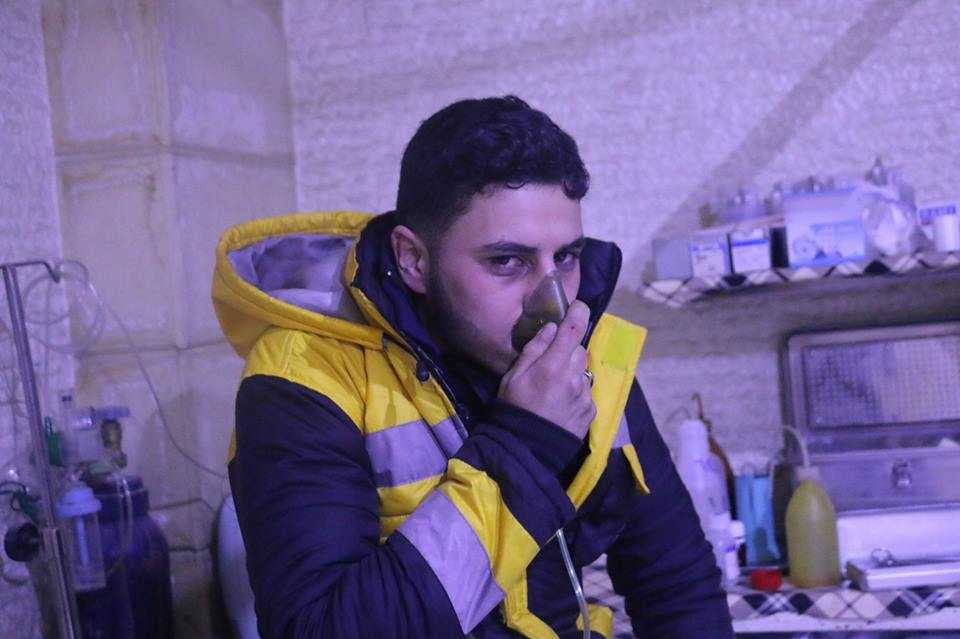Chlorine gas attack suspected in East Ghouta for third time this year
AMMAN: A suspected chlorine gas attack on the besieged, rebel-held […]
1 February 2018
AMMAN: A suspected chlorine gas attack on the besieged, rebel-held East Ghouta suburbs of Damascus injured four civilians on Thursday, medical and Civil Defense sources tell Syria Direct, in the third strike of its kind in less than one month.
Three surface-to-surface missiles possibly carrying chlorine gas hit a residential area of the rebel enclave’s de facto capital of Douma city early Thursday morning, Siraj Mahmoud, the spokesman for the local Civil Defense told Syria Direct. The attack injured four people, he said.
The injured—three women and a Civil Defense member—exhibited symptoms including shortness of breath, coughing, red eyes and bronchial irritation, Abu Salem, a doctor at the Damascus Countryside Specialized Hospital in Douma, where the patients were treated, told Syria Direct. The doctor asked not to be identified by his full name, fearing repercussions for family members in government-held territory.

Doctors at the Specialized Hospital removed the patients’ clothing, which “smelled of bleach,” and put them on nebulizers, Abu Salem said. All are now reportedly in stable condition.
Thursday’s strikes, which hit the western Douma neighborhood of al-Malaab, constitute the third alleged chlorine gas attack on the city this year.
Previous attacks on January 22 and January 13 caused symptoms consistent with chemical exposure in more than two dozen civilians.
US Secretary of State Rex Tillerson condemned the January 22 strike the following day while speaking at the Paris launch of the International Partnership Against Impunity for Use of Chemical Weapons. The French-led body is tasked with seeking accountability for chemical weapon use.
“The recent attacks in East Ghouta raise serious concerns that Bashar al-Assad’s Syrian regime might be continuing its use of chemical weapons against its own people,” said Tillerson, reported Voice of America.
Tillerson also accused Syrian government ally Russia of sharing responsibility for the attacks.
Moscow’s ambassador to the UN, Vassily Nebenzia, denied involvement and called it a “strange coincidence” that the attacks took place a day before the Paris event where Tillerson spoke.
The permanent Syrian delegation to the UN also rejected US accusations, calling them “baseless and unsurprising,” state media outlet SANA reported on January 25.
Abu Muhammad Laith, a resident of the al-Malaab neighborhood that was hit on Thursday, said the suspected chemical strikes reflected the international community’s inability to prevent attacks on Syrian civilians.
“All of the countries condemned [chemical] gas use,” Laith said, “but the regime continues to bomb us.”
Laith said he lives “about 300 meters” from the bomb site, but he wasn’t harmed.
“Thank God the weather is cold, my windows are closed tight and it’s windy outside,” he told Syria Direct Thursday morning. “We could have suffocated from the gases.”
The Syrian government has repeatedly used chemical weapons in attacks on opposition-held areas, according to the UN Commission of Inquiry on Syria, whose latest report, released last September, notes the use of weaponized chlorine in East Ghouta.
“These attacks constitute clear violations of international humanitarian law and the Convention on Chemical Weapons,” the report says.
The Syrian Arab Republic ratified the convention in 2013 following a sarin gas attack on opposition-held neighborhoods in East and West Ghouta that killed at least 1,400 people.
The East Ghouta enclave, which has been encircled by government forces since 2013, was included in a Russian- and Iranian-backed de-escalation deal brokered last May.
Despite the deal, a weeks-long government offensive on the pocket that began on December 29 has reportedly killed more than 200 civilians in the besieged opposition enclave.
“The regime wants to send a message to the people of Ghouta,” Douma resident Laith said, “that our deaths will come from hunger, bombing or suffocation, and the world will merely offer its condemnation.”







